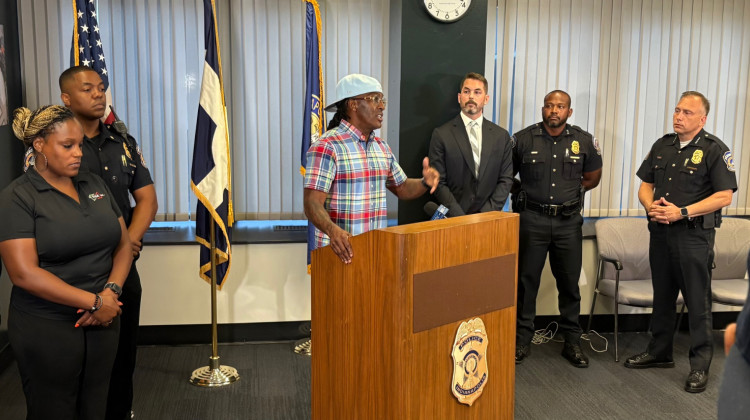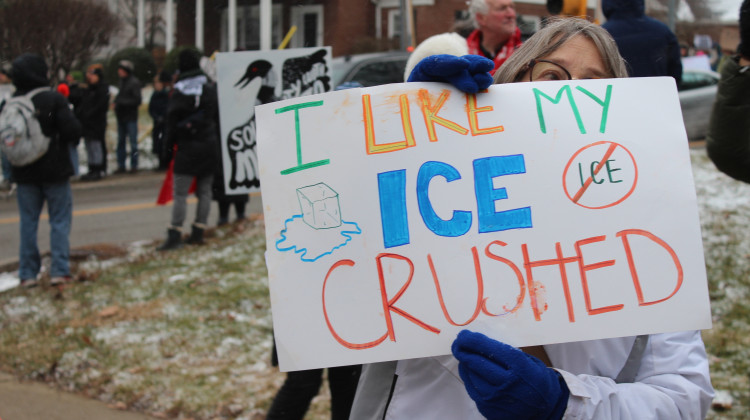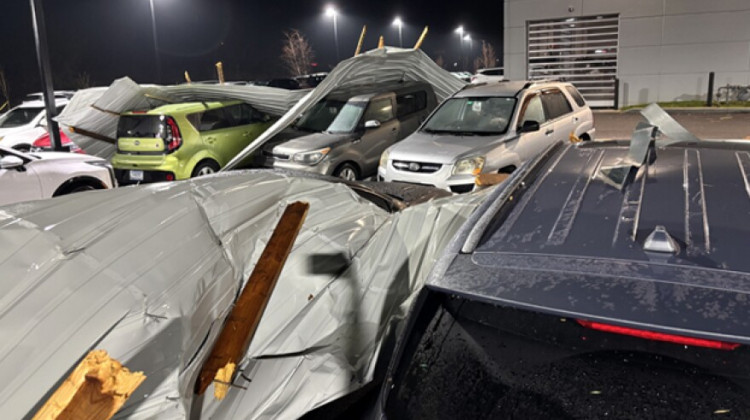
City officials, IMPD and local nonprofits announce curfew implementation plans this week at the City County Building.
Jill Sheridan / WFYIThe Indianapolis City-County Council is one step closer to shortening curfew hours for young people in downtown Indianapolis.
The proposal, introduced at a city council meeting earlier this month, would extend the hours when Marion County children and teens are prohibited from being in public spaces without supervision.
At a meeting Wednesday night, the city’s Public Safety and Criminal Justice Committee passed an amended version of the curfew proposal, which now heads to the full City-County Council with a recommendation to pass.
State law allows moving curfew hours by up to two hours when conditions necessitate it for public safety, but it’s only a temporary measure. The proposed public safety curfew hours are designed to expire after 120 days unless the council takes further action.
The state already has a statewide curfew. The proposal would begin the curfew two hours earlier in Marion County. The curfew for youth 15- to 17-year-olds would be between 9 p.m. to 5 a.m. Sunday to Thursday and between 11 p.m. to 5 a.m. Friday and Saturday.
This isn’t the first time a curfew for young people has come into play. The city imposed an ordinance last year in response to a spike in youth-involved gun violence around the city. In March 2024 a mass shooting injured 7 young people between the ages of 12 and 16 in downtown Indianapolis.
But in a recent statement from IMPD, the department wrote that mass enforcement of curfew laws presents real challenges, including, “questions about where to take the children, the staffing required to both enforce the law and keep the rest of the city safe, and whether the broader system has the capacity to process a large number of youth at once.”
“IMPD cannot carry this burden alone, nor should we,” the department wrote in a statement on Monday, July 7, emphasizing the need for collaboration with courts, government, community organizations and families.
The city has also announced a new location where they will take teens in violation of the city’s current youth curfew, where they can access "supportive services" and reunite with guardians. If youth cannot be reunited with family or caregivers, they may be taken to the Juvenile Detention Center for a status offense. The initiative is expected to roll out this weekend, coinciding with the WNBA All-Star festivities downtown.
What the research says about curfews
Youth curfews largely date back to the Clinton administration, when the president called on cities and towns to create nightly curfews on teenagers to stop juvenile violence and promote family stability.
Researchers have sought to figure out how the youth curfews — which have grown in use in recent years — actually impact crime and violence.
Although many studies cite a need for more research on the issues, numerous studies have found that curfews are ineffective at reducing crime and victimization.
In 2015, professors at the University of Virginia and Purdue University published a study measuring the impact of youth curfews on gun violence in Washington D.C. Researchers found the effect on public safety was “ambiguous,” and even found that curfews increased incidents of gun violence.
A 2016 systematic review by the Campbell Collaboration, an international social science research network, analyzed more than 7,000 studies on juvenile curfews and found little evidence that they reduce crime or victimization.
In an interview with Time Magazine, Dave Myers, chair of the criminal justice department at the University of New Haven, said research shows curfews don’t have much impact.
“They tend to be popular at face value,” Myers said. “They sound good, look good, and are easy to implement — but when it comes to reducing crime, the impact just isn’t there.”
‘It's too little too late’
At the meeting, the committee approved an amendment to the proposal — including new language to reassure officers they’ll be legally protected.
The committee revised the language to reassure officers that they’re entitled to legal defense and indemnification — even though that protection already exists in other statutes.
Rick Snyder, president of the Fraternal Order of Police union chapter representing IMPD officers, told the committee that many officers have a “trust factor” issue with city leadership — especially after past emergency curfew arrests weren’t prosecuted, leaving some officers feeling exposed to individual lawsuits.
"They haven't forgotten 2020,” he said. “When this mayor invoked emergency curfews and when they step forward to make those arrests, they were immediately met with a prosecutor that said, ‘I won't file anything on that. And we're putting them in a liability loop. And they know it.’”
Snyder condemned the committee for not doing something sooner.
“While I appreciate what all of you are doing here tonight. It's too little too late,” he said. “We have dead kids.”
Farrah Anderson is an investigative health reporter with WFYI and Side Effects Public Media. You can follow her on X at @farrahsoa or by email at fanderson@wfyi.org.
 DONATE
DONATE






 Support WFYI. We can't do it without you.
Support WFYI. We can't do it without you.